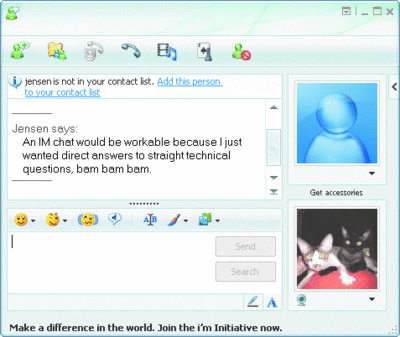Field NotesIM Interviews
Nathan G. Jensen
Recently, my company posted an ad online for a senior software engineer (telecommute position) and we were immediately deluged by applicants from all over the world. As the lead developer, I was tasked with conducting technical interviews for this massive candidate pool. I stared tiredly at the huge list and scanned one inflated resume after another. I knew from experience that most of these applicants would be unqualified, which is why tech interviews are so essential.
As I contemplated conducting telephone interviews with this long lineup, one after another, I thought, "this is going to take a month!" And then it hit me. I had an epiphany—a vision—an idea fell from that great IT Department in the sky: do the interviews over IM! It was brilliant! And it worked.
I began by sending a mass-e-mail message to all candidates via BCC, explaining that a thorough technical interview would be required and Windows Live™ Messenger—not the telephone—would be the means of communication. The e-mail screened out about half the applicants, presumably because they knew they couldn't bluff their way through the tech interview. For the rest, I felt that an IM chat would be workable because I just wanted direct answers to straight technical questions, bam bam bam. At this stage of the interview process, soft skills and oration didn't matter much.

Figure ** I had multiple IM windows open, firing tech questions at all of them like Whac-a-Mole **(Click the image for a larger view)
My first observation was that this high-tech form of interviewing would save time and money. No phone bills. And as the applicants began to ping me for an interview, I realized that I could field several of them simultaneously and efficiently. This was actually quite a hoot. I had multiple IM windows open, firing tech questions at all of them like Whac-a-Mole. And because I had pretyped the questions, this was largely an exercise of copy and paste.
I carefully Web-screened my questions so as to minimize pretty answers lifted from the Internet. If somebody posted an answer that looked like it came from a polished article or official documentation, it would be obvious. Additionally, Windows Live Messenger can track the timestamp of each response so that you can go back later and determine which candidates were taking too long to answer.
Another "A-ha" moment occurred for me when, in the midst of these side-by-side IM chats, my phone rang and I realized that I could continue with the interviews and talk on the phone all at once. This was the pinnacle of multithreaded efficiency!
And just when I thought this gig couldn't get any better, another benefit surfaced. My biggest irritation around phone-based tech interviews is when I ask a short question and expect a short answer but instead receive a five minute dissertation. With IM this is eliminated because people tend to be terse with their IM replies.
At the end of each interview I saved the chat logs so that I had a record for later review and judgment. And I could send these logs to my boss for objective comparison. In the end, the whole process took a few hours instead of a week—which is how long it would have taken to set up times and interview the 25 candidates by phone.
I couldn't have been happier with my discovery. We hired the person who rapid-fired the correct answers back and then had a good "soft" interview with my boss by phone. It was fast, efficient, productive, and landed us the right candidate for the job just a few days after it was posted.
Nathan G. Jensen is a lead Web developer and freelance writer living in Salt Lake City. You can contact him by visiting builderdash.com.
© 2008 Microsoft Corporation and CMP Media, LLC. All rights reserved; reproduction in part or in whole without permission is prohibited.